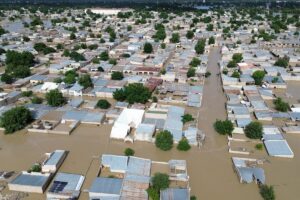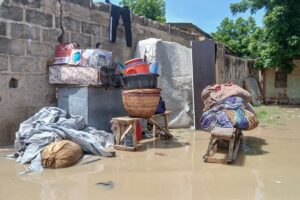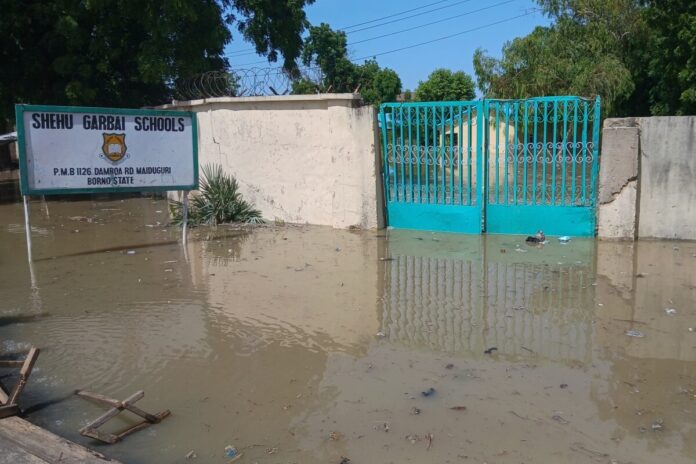A major public safety crisis has emerged in Maiduguri, the capital of Borno State, after severe flooding led to the escape of at least 286 inmates from the Maiduguri medium-security custodial centre. This alarming incident, which took place on Tuesday, highlights the increasingly serious impact of the flooding that has overwhelmed the city since the weekend.
The flooding, caused by excess water from the Alau Dam, has devastated several parts of Maiduguri. One of the dam’s spillways collapsed, dramatically increasing water flow downstream and worsening the flood’s effects in numerous neighborhoods. These include Shehuri, Government Residential Area (GRA), Gambomi, Budum, Bulabulin, Adamkolo, Millionaires Quarters, Monday Market, and Gwange. The floods, which first began over the weekend, intensified on Monday, 9th September 2024, as water levels rose to critical levels, inundating many parts of the city.
 The breach of the Alau Dam triggered widespread damage to infrastructure and prompted urgent evacuations, including at the medium-security prison. As the floodwaters surged into the facility, hundreds of inmates took advantage of the chaos to flee. Local sources reported that many prisoners, including those facing long sentences, escaped in the confusion, raising concerns about public safety in the already volatile region.
The breach of the Alau Dam triggered widespread damage to infrastructure and prompted urgent evacuations, including at the medium-security prison. As the floodwaters surged into the facility, hundreds of inmates took advantage of the chaos to flee. Local sources reported that many prisoners, including those facing long sentences, escaped in the confusion, raising concerns about public safety in the already volatile region.
In response to the crisis, Nigeria’s Minister of Interior, Olubunmi Tunji-Ojo, arrived in Maiduguri to assess the damage caused by the flooding and to investigate the escape. His visit underscores the gravity of the situation, as the federal government grapples with the dual challenges of securing public safety while managing the extensive damage caused by the floods. A statement from the Ministry of Interior confirmed that Tunji-Ojo’s visit would involve close coordination with local authorities to understand the full scale of the disaster and to implement measures to prevent further incidents.
 The spokesman for the Nigerian Correctional Service, Umar Abubakar, acknowledged the scale of the escape but sought to reassure the public that efforts were underway to resolve the situation. Abubakar noted that federal and local authorities are collaborating to track down the escaped inmates and bring them back into custody. “We are working with sister security agencies to ensure public safety and to take the necessary actions in response to this unfortunate event,” Abubakar said, stressing that authorities are not leaving any stone unturned in the search for the escaped prisoners.
The spokesman for the Nigerian Correctional Service, Umar Abubakar, acknowledged the scale of the escape but sought to reassure the public that efforts were underway to resolve the situation. Abubakar noted that federal and local authorities are collaborating to track down the escaped inmates and bring them back into custody. “We are working with sister security agencies to ensure public safety and to take the necessary actions in response to this unfortunate event,” Abubakar said, stressing that authorities are not leaving any stone unturned in the search for the escaped prisoners.
In addition to managing the security crisis, authorities are also focusing on humanitarian relief efforts for those impacted by the flood. The National Emergency Management Agency (NEMA) has taken the lead in providing assistance to flood victims, including food, shelter, and medical care. In a statement released on Tuesday, NEMA confirmed that it is working closely with the Borno State Government to provide relief in the most affected areas. Bakassi Camp, a well-known facility for internally displaced persons, has been reopened to accommodate those displaced by the flood.
The devastation caused by the flood, which has affected both residential and commercial areas, has left many people homeless. Areas like the Government Residential Area, Millionaires Quarters, and the Monday Market, where businesses and homes were submerged, are struggling with extensive damage. NEMA’s statement noted that President Bola Tinubu has ordered the agency to take immediate action to assist flood victims. This directive follows reports that hundreds of people in Maiduguri have been displaced by the flood, with many families forced to flee to higher ground or makeshift camps for safety.
The response from the Borno State Emergency Management Agency (SEMA) has also been swift, as state authorities work to mitigate the fallout from the disaster. Both agencies are coordinating efforts to provide emergency supplies, clean water, and medical aid to those who have been affected. Borno State Governor Babagana Zulum has expressed his administration’s commitment to supporting relief efforts and ensuring that the displaced populations receive the necessary care and assistance. He has called on the federal government to increase its support for flood relief in Borno, given the unprecedented scale of the disaster.
As the situation continues to unfold, the flood in Maiduguri has brought new challenges to a region already grappling with conflict, displacement, and insecurity. The collapse of the Alau Dam spillway and subsequent inmate escape are just the latest chapters in a growing humanitarian crisis. While authorities race to regain control of the situation, the priority remains securing public safety and ensuring that both displaced residents and escaped inmates are accounted for.
Local communities are already dealing with the aftermath of the flooding, with many expressing concerns about the health risks posed by contaminated water and poor sanitation. Disease outbreaks are a looming threat, particularly in overcrowded temporary shelters like Bakassi Camp, where displaced families are being housed. The conditions in these camps remain dire, and the potential for waterborne diseases such as cholera is high. NEMA’s efforts to provide clean water and sanitation facilities are crucial in preventing a secondary disaster in the form of a public health emergency.
With more rains expected in the coming days, Maiduguri and other parts of Borno State face an uphill battle. The escape of over 280 inmates is a stark reminder of the broader challenges that emerge in the wake of natural disasters. In the meantime, security forces are on high alert, with increased patrols and checkpoints set up across the city in an effort to track down the escaped prisoners and prevent further incidents. As the clean-up and recovery process begins, Maiduguri residents are left to deal with the dual crises of flood recovery and heightened insecurity.




